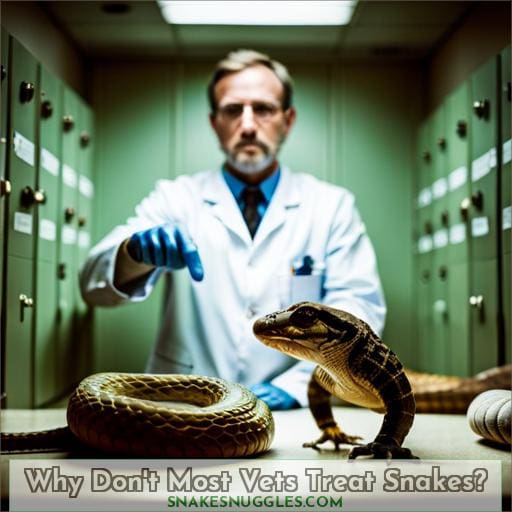This site is supported by our readers. We may earn a commission, at no cost to you, if you purchase through links.

Here we discuss tips on finding the right reptile vet who can provide your scaly friend with quality care.
Get ready to find out if there’s a vet near you who has experience in treating these amazing creatures so that your pet stays healthy and happy!
Table Of Contents
- Key Takeaways
- Why Don’t Most Vets Treat Snakes?
- How Do Snakes Differ Anatomically From Other Pets?
- How Do I Select a Snake?
- My Snake Looks Healthy. Does He Really Need to See a Veterinarian?
- Ask Your Existing Practice
- Speak With Your Local Reptile Provider
- Reptile Forums
- Frequently Asked Questions (FAQs)
- Conclusion
Key Takeaways
- Snakes require specialized veterinary care.
- There is limited availability of vets who deal with snakes.
- Regular vet visits are crucial for snake health.
- Recommendations for reptile-savvy vets can be found through existing practices or forums.
Why Don’t Most Vets Treat Snakes?
It is often surprising to discover that most vets do not treat snakes due to their different physiology, exotic nature, and the general misunderstanding of these animals. Snakes have an anatomy and reproductive system that are unlike other animals, are not commonly found in many households as pets, and they tend to be feared or overlooked due to myths about them.
Snakes Have a Different Physiology
Due to anatomical differences, you need an experienced vet who is comfortable with reptile care to ensure your snake remains healthy. Snakes have a unique physiology – multiple lungs, except boas and pythons; a smooth, dry skin shedding process; varied diet requirements; and ectothermic needs for external temperature regulation.
Breeding habits also differ from other animals, making regular vet visits essential for monitoring health indicators like eyes, skin, and vent. Snake health requires specialized knowledge of anatomy and careful care, which can be found in vets that specialize in reptiles or through online resources offering advice from experienced keepers.
Many Snakes Are Exotic Animals
Many pet snakes are exotic animals that require specialized care from experienced veterinarians. They have specific dietary needs, heating requirements, and enclosure size. It is important for owners to have prior experience and knowledge in handling these reptiles.
To ensure the health and safety of your exotic snake, it is advisable to consult with experts or seek advice from online forums. Experienced owners can also join reptile forums to exchange the most up-to-date husbandry tips with other snake enthusiasts worldwide.
Snakes Are Misunderstood
Misunderstanding snakes can have dire consequences for their health and well-being. Pet care requires a good understanding of species differences, snake diet, behavior, and environmental needs. Family vets may not be able to provide adequate pet care due to a lack of knowledge about reptiles in general.
Vet research is essential for safe treatment and prevention of illness in pet snakes. Experienced reptile keepers can also offer valuable advice on proper snake care. Misconceptions about their anatomy, physiology, or husbandry requirements must be addressed with vet expertise before attempting any kind of medical intervention or preventative measures with the animal’s well-being as the priority goal.
How Do Snakes Differ Anatomically From Other Pets?
You may be surprised to know that snakes are anatomically distinct from other pets in many ways. For instance, they have smooth scales instead of fur or feathers and shed their entire skin regularly.
Additionally, their reproductive systems differ as well. Male snakes possess hemipenes for reproduction, while females lay eggs during the breeding season.
Snakes also require external heat sources like sunlight and warm rocks since they are ectotherms dependent on the environment’s temperature to regulate body functions.
Lastly, most species feature a three-chambered heart with only one lung, except boas and pythons, which exhibit two lungs!
A reptile provider or experienced keeper can provide further insight regarding feeding habits as well as anatomy when preparing for a snake examination at an exotic vet clinic. This emphasizes the importance of seeking specialized care due to anatomical differences between reptiles, such as snakes, compared with other pets like cats or dogs.
How Do I Select a Snake?
When it comes to selecting a snake, there are some important considerations you need to keep in mind. First and foremost, make sure you get your snake from a reputable breeder or pet store with experience in reptile-specific knowledge.
You also want to consider the habitat needs of the species when choosing your new companion, as well as handling safety and food selection for optimal health. Stress prevention is key; wild-caught snakes may be more prone to stressors due to their previous living conditions, which can affect feeding habits or cause parasites.
Additionally, consult a reptile veterinarian that specializes in snakes if possible so any questions regarding diet or care can be answered accordingly by someone with expertise on reptiles specifically, rather than relying solely on old medications or advice from forums alone.
With just these few steps taken prior to bringing home your new friend, it will help ensure that they live an abundant life full of love!
My Snake Looks Healthy. Does He Really Need to See a Veterinarian?
Although your snake may look healthy, it’s important to consult a reptile-savvy vet for an annual exam and fecal check.
Reptiles require specialized treatment and care. Even a seemingly benign issue such as shedding can signal stress factors or health issues. With over 2,500 species of snakes available as pets, differentiating between them in terms of their requirements for housing and diet requires veterinarian advice from someone experienced with reptiles.
Blood tests or X-rays might be necessary if any abnormalities are observed during the exam. So make sure to find a reputable veterinary practice that specializes in reptiles. Keeping up with regular antiparasitic treatments, along with husbandry tips offered by local reptile providers, helps keep your snake happy and healthy.
Adopting captive-bred snakes also decreases the chances of health problems due to parasites or feeding issues associated with wild catches.
Ask Your Existing Practice
Check with your existing practice to see if they have any experience in treating reptiles. Reptiles require unique care and treatment, so it’s important to find a vet who is experienced with snakes or other reptiles.
Ask the veterinary nurse for advice, as they may be able to point you in the right direction of finding an exotic vet near you.
Your local reptile provider can also suggest reputable vets that come recommended by experienced keepers and are familiar with snake safety protocols. You should also research online resources such as forums or RCVS databases, which list specialized practices certified for reptile care and qualified experts who provide up-to-date treatments for various ailments related to pet reptiles.
Seeking recommendations from trusted sources will help ensure that your snake gets the best possible medical attention available from properly trained professionals!
Speak With Your Local Reptile Provider
Reach out to your local reptile provider for recommendations on experienced vets that specialize in snake care. They can provide invaluable insights into which vet practices are best equipped to handle the unique anatomy, physiology, and health problems of snake species like common snake illnesses.
.
From pet snakes with one lung, different reproductive systems than other animals, and adoption processes involving weight checks – online resources or herpetologists can’t always be trusted with these specialized tasks.
Look for exotic vets who understand the nuances of snake lungs and reproduction. A vet’s expertise is essential when it comes to ensuring proper health care for your beloved pet! Ask about their experience in handling delicate issues like parasite control or stress-induced appetite loss before adopting from them.
Also, inquire whether they offer any annual exams including fecal tests. Finally, consider blood tests or X-rays if needed.
Reptile Forums
Reaching out to reptile forums is a great way to get insights from experienced keepers, as well as tips on evolving husbandry practices. You can also find recommendations for reputable vets in your local area. Connecting with the global snake-keeping community gives you access to up-to-date information and resources that will help ensure your pet’s health and well-being.
Global Keeper Insights
You can gain invaluable insight into caring for snakes by consulting experienced keepers on reptile forums. Pet stores and breeders’ advice may only get you so far, but vet forums often provide up-to-date tips and suggest specialist vets in your area who specialize in snake health.
Look out for signs of poor condition such as dry or flaky skin, a swollen vent area, or mouth infection to ensure the best care possible is being provided. Exotics care from reputable sources allows you to identify any potential issues before they become life-threatening.
Evolving Husbandry Tips
Explore reptile forums for up-to-date tips on caring for your pet snake: Feeding habits, vet selection, stress management, heat sources, and pet care are all discussed. Learn how to keep snakes healthy through best practices in nutrition and temperature control.
Find out the recommended frequency of vet visits and which vets specialize in reptiles. Uncover methods to reduce stress-related issues from relocating or handling snakes too frequently. Discover what type of heating source works best according to species’ needs as well as potential risks associated with incorrect temperatures or humidity levels set incorrectly within an enclosure setup.
Local Reputable Vets Recommendations
Seeking advice from people in the know can help you find a trustworthy and knowledgeable vet for all your reptile needs – because knowledge is power! Consider asking experienced keepers, local providers, or online reptile forums.
They may be able to provide recommendations on reputable vets with experience in pet selection, veterinary care, snake anatomy, and cloaca function, as well as stress management. Don’t forget to include exotics nursing teams for added expertise when necessary.
Ensuring proper care by researching available options helps protect your beloved reptiles from unnecessary risks.
Frequently Asked Questions (FAQs)
What kind of environment should I provide for my snake?
Provide your snake with a warm, secure environment that is free of drafts and predators. Offer an appropriate temperature range, humidity levels – between 50-70%, hiding spots, and enriching activities for the best health.
Provide a proper diet according to species needs; offer variety in food items for optimal nutrition.
Is there a way to determine the age of my snake?
Determining the age of a snake can be tricky. Look for signs such as size, color, and behavior that could offer clues. Ask an experienced keeper or vet for help if needed to accurately assess the age of your pet reptile.
What kind of diet should I provide for my snake?
Provide your snake with a varied diet that includes fresh rodents, birds, and fish for protein. Supplement their meals with occasional fruits and vegetables to ensure they receive essential vitamins and minerals.
Consider offering pre-killed prey to reduce the risk of injury or infection from live food sources.
How often should I clean my snake’s enclosure?
Clean your snake’s enclosure regularly to maintain its health and well-being. Depending on the size, the frequency will vary – monthly for small enclosures or weekly for larger ones. Conduct a thorough clean each time with warm water and disinfectant, being sure to remove all waste material.
What kind of medical issues can affect my snake?
Your snake can suffer from a range of medical issues, such as parasites, dehydration, and stress. Make sure to visit an experienced reptile-savvy vet and have them conduct regular checkups for any abnormalities or signs of illness.
Conclusion
With over 2,500 snake species, it’s not surprising that many vets don’t treat snakes due to their unique anatomy and physiology. However, it’s important to find a vet who has experience caring for reptiles to ensure your snake is healthy and happy.
Fortunately, there are many resources available to help you find the right vet. You can ask your existing practice or seek advice from experienced keepers. Additionally, you can utilize online resources. With the right knowledge and care, you can provide your snake with the best possible care to ensure a long and healthy life.
So don’t be discouraged if your vet doesn’t treat snakes. There are plenty of options to ensure your snake is well taken care of.













